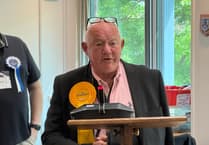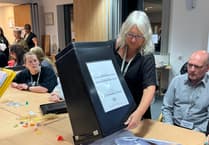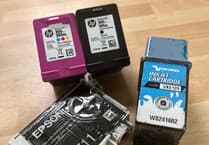IN these uncertain times of increased hand-washing, spatial awareness, self-isolation, event cancellations and postponements, it is good to see that people are united in adversity - being caring and helping others.
The COVID-19 virus has certainly inspired people to rally together to help neighbours, relations and the vulnerable, none more so in Crediton and the surrounding area.
Many are helping others with things like shopping, collecting prescriptions, fetching and carrying or helping in other ways.
IN YOUR NEIGHBOURHOOD
Would you be prepared to help sick, vulnerable and self-isolated people in your community who have no-one else to turn to during Coronavirus? If so, Neighbourhood Watch (NW) would like to hear from you.
NW would like to encourage as many groups as possible to make plans to support their neighbours in case they need to check on the welfare of people who have had to self-quarantine or need help.
It believes that the key is organising local Good Neighbour Groups now, before more people get ill, so that a local contact telephone number can be delivered to each address BEFORE people become wary of going door-to-door, or a Lockdown is put in place. From that point, all communication can be by telephone.
NW is asking people to establish Good Neighbour Groups in their communities to identify vulnerable people, and those who self-isolate, by doing a leaflet drop in the area, inviting people to contact a local telephone number for support.
NW would expect that local volunteer co-ordinators will then organise a regular telephone call to check on the welfare of those who ask for help, to check that their basic needs can be met, e.g. for food, medication, electricity etc, until they recover, or to notify the emergency services if required.
For further information, email: [email protected] .
CREDITON
In Crediton the Town Council’s Community Emergency Plan has been put into action.
The aim of the Plan is to provide Crediton with an outline to support itself when other agencies are overstretched and to increase the resilience of the Town.
This has been devised by the Emergency Plan’s Community Response Team (CRT), made up of members of the community with local knowledge.
The plan includes a list of “vulnerable people” within the town. The aim of this list is to ensure that the CRT is aware of who may need extra help or support during any kind of emergency.
If you consider yourself to be vulnerable in any way and would like to be added to the Council’s Vulnerable Person Register, please complete the form available from the Town Council office in North Street and returning it to the address provided.
All information is treated as confidential.
For further details, email: [email protected] or telephone 01363 773717.
COPPLESTONE
At Copplestone, Mid Devon District Councillor Stuart Penny is leading a small group of volunteers to provide assistance to those members of our community who are prevented from going about their business, due to the restrictions being implemented by central government with regard to the COVID-19 pandemic.
He explained: “It is extremely important that the community pulls together and looks out for those who are vulnerable, not just the elderly, but those that fall into high risk groups and those self isolating as well.
“I would strongly urge other parishes to do likewise. If anyone within Copplestone parish wishes to volunteer to assist or indeed needs assistance they can contact me on 07890 284871 or by email: [email protected] .
Sandford Parish Council is holding a public meeting at St Swithun’s Church, Sandford, tonight, Friday, March 20, to discuss how the parish can deal with coronavirus.
TRADERS
A number of Crediton Traders are trying to band together to organise local deliveries to those who are isolated or do not want to leave their homes.
Many others are also offering delivery services.
EVENT CANCELLATIONS OR POSTPONEMENTS
Many events and activities are being cancelled or postponed in view of the current situation.
The Diocese of Exeter has decided to cancel the Gift of Years event in Crediton which was due to take place today, March 20, as it feels it would be irresponsible to bring together a high risk group of people (the event was for those over 60) in the light of COVID-19.
It has also, like many other churches, cancelled services but some are being held on-line.
Many village halls have closed, the Punchbowl Recycling Centre is closed until further notice, many councils have stopped holding meetings, Winkleigh Morris has suspended practices and most sporting games and matches have been suspended.
The Government announced on Friday, March 13, that it was postponing local elections due to have taken place in May by one year.
Crediton Farmers’ Market has been cancelled until further notice and the Turning Tides historical exhibition has been cancelled.
Many clubs, such as the Young Farmers’ Clubs have cancelled meetings.
Yeofest 2020, which was due to take place this month will now combine with YeoCider, which will be held in October.
Sandford Parish Hall Bingo, which was due to be held tonight, Friday, March 20, has been cancelled, as well as the Easter Bingo.
Crediton AFC “Best of British” disco which was due to be held on March 28 has been postponed to later in the year.
Cheriton Fitzpaine Easter Bingo on April 3 has been cancelled.
Crediton Museum has cancelled its exhibition and the Devon County Show will now take place in August.
Many clinics and surgeries are suspending walk in urgent care clinics. Telephone services are operating.
The car wash at Crediton Fire Station which was due to take place tomorrow, March 21 has been postponed until later in the year.
The Hospiscare Easter Fayre and Egg Hunt due to be held on March 28 at Helmores has been cancelled.
A list of event cancellations or postponements can be found in the Kirton Raiser each week in the “Crediton Courier”.
If you would like publicity about an event, or the cancellation or postponement of an event, please get in touch by email: [email protected] or telephone the Courier office on 01363 774263.
ADVICE
What are the symptoms of the new coronavirus?
According to the World Health Organization (WHO), the main symptoms of the coronavirus usually include:
• A dry cough
• A temperature
• Tiredness
• Shortness of breath (in more severe cases)
Some patients may have "aches and pains, nasal congestion, runny nose, sore throat or diarrhea", the WHO adds. "These symptoms are usually mild and begin gradually. Some people become infected but don’t develop any symptoms and don’t feel unwell".
These symptoms are similar to other respiratory diseases including flu and the common cold. So if you have symptoms, consider the following:
• Have you travelled to a high risk area such as China, South Korea or Northern Italy in the last two weeks?
• Have you been in close contact with someone with coronavirus
How quickly do symptoms emerge?
Symptoms are thought to appear between two and 10 days after contracting the virus, but it may be up to 24 days.
Most people (about 80 per cent) recover from the disease without needing special treatment. However, around one out of every six people (16 per cent) becomes seriously ill and develops difficulty breathing.
Older people, and those with underlying medical problems like high blood pressure, heart problems, lung complaints or diabetes, are more likely to develop serious illness.
When should I seek medical help?
People having difficulty breathing should seek medical attention quickly. But do not go out. Instead, you should call NHS 111.
If you just have a fever and a cough - the main early symptoms of coronavirus - the government now advises that you self-isolate for seven days. This will help protect others.
If you live alone, ask your employer, friends and family to help you to get the things you need.
If you live with others, try and stay at least two metres away from other people. Also sleep alone if possible. And stay away from vulnerable individuals such as the elderly and those with underlying health conditions.
You do not need to call NHS 111 to go into self-isolation. But if your symptoms worsen during home isolation or are no better after seven days contact NHS 111 online. If you have no internet access, you should call NHS 111.
For a medical emergency dial 999.
What if I feel fine but have recently returned from a high risk area?
In some cases you may be asked to self-quarantine to protect others even if you do not have symptoms but have travelled to a high risk area.
Use this NHS advice tool at: https://111.nhs.uk/covid-19 to find out what to do to protect yourself and others.
Do not go to a GP, pharmacy or hospital as if you have the virus you may infect others.
How to ’self isolate’ if you think you might have coronavirus
If you think you may have the virus, you should try to isolate or quarantine yourself.
This means you should:
Stay at home
Avoid work, school and other public areas
Avoid public transport and taxis
Get friends and family to delivery food, medicines etc rather than going to the shops
Discourage visitors.
How is the new coronavirus spread and how can I protect myself?
Hand hygiene is the first and most important line of defence.
Like cold and flu bugs, the new virus is spread via droplets when a person coughs or sneezes. The droplets land on surfaces and are picked up on the hands of others and spread further. People catch the virus when they touch their infected hands to their mouth, nose or eyes.
It follows that the single most important thing you can do to protect yourself is to keep your hands clean by washing them frequently with soap and water or a hand sanitising gel.
Also try to avoid touching your mouth, nose or eyes with unwashed hands – something we all do unconsciously on average about 15 times an hour.
Other tips include:
Carry a hand sanitiser with you to make frequent cleaning of your hands easy
Always wash your hands before you eat or touch your face
Be especially careful about touching things and then touching your face in busy airports and other public transport systems
Carry disposable tissues with you, cover your nose and mouth when you cough or sneeze and dispose of the tissue carefully (catch it, bin it, kill it)
Do not share snacks from packets or bowls that others are dipping their fingers into
Avoid shaking hands or cheek kissing if you suspect viruses are circulating
Regularly clean not only your hands but also commonly used surfaces and devices you touch or handle.
WELL PREPARED
The NHS in Devon and Public Health England (PHE) are extremely well prepared for outbreaks of new infectious diseases.
Further information is available on the website: www.nhs.uk .





Comments
This article has no comments yet. Be the first to leave a comment.